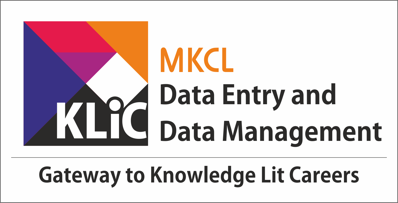- Understanding the importance of data management in various domains.
- Exploring different free and open-source tools available for data management.
- Learning how to use these tools for data collection, storage, organization, analysis, and visualization.
- Implementing best practices for efficient data management using these tools.
- Applying their knowledge to real-world scenarios and projects.
- Understanding the importance of data visualization in data analysis and decision-making.
- Exploring different data visualization techniques and tools for various types of data.
- Learning automation strategies to streamline data-related tasks and workflows.
- Implementing automation tools and techniques to increase productivity and efficiency.
- Applying data visualization and automation strategies to real-world scenarios and projects.

Advanced Data Mastery
Work with large datasets, apply filtering, formulas, and manage records effectively.
KLiC Certificate in Advanced Data Mastery
Introduction
What you'll learn ?
- Understand the importance of effective data management in various contexts.
- Identify suitable free and open-source tools for different aspects of data management.
- Utilize tools for data collection, storage, organization, analysis, and visualization effectively.
- Implement best practices for efficient data management, including data cleaning, security, and documentation.
- Apply their knowledge and skills to real-world data management tasks and projects.
- Analyze data effectively and present insights using appropriate visualization techniques.
- Collaborate with others using version control and documentation practices.
- Continuously improve their data management skills through self-learning and exploration of new tools and techniques.
- Understand the importance of data visualization and automation in data analysis and decision-making.
- Choose appropriate data visualization techniques and tools for different types of data.
- Utilize data visualization tools effectively to create insightful and interactive visualizations.
- Implement automation strategies to streamline data-related tasks and workflows.
- Apply automation tools and techniques to increase productivity and efficiency in data management.
- Integrate data visualization and automation to create automated reporting systems and dashboards.
- Implement best practices for effective data visualization design and automation implementation.
- Analyze real-world data scenarios and apply data visualization and automation strategies to solve problems and make informed decisions.
Syllabus
- Importance of data management
- Overview of free and open-source tools
- Introduction to data collection
- Overview of tools for data collection (e.g., Open Data Kit, Kobo Toolbox)
- Introduction to data storage and organization
- Overview of tools for data storage and organization (e.g., MySQL, PostgreSQL, SQLite)
- Introduction to data analysis
- Overview of tools for data analysis (e.g., R, Python with pandas library, Jupyter Notebooks)
- Introduction to data visualization
- Overview of tools for data visualization (e.g., Matplotlib, Seaborn, Plotly)
- Data cleaning and preprocessing
- Data security and privacy
- Data documentation and version control
- Applying free and open-source tools to real-world data management scenarios
- Analyzing case studies and examples
- Importance of data visualization
- Benefits of effective data visualization
- Overview of data visualization techniques (e.g., charts, graphs, maps)
- Choosing the right visualization for different types of data
- Introduction to data visualization tools (e.g., Tableau, Power BI, Python libraries like Matplotlib and Seaborn)
- Hands-on exploration of visualization tools
- Interactive visualizations
- Dashboard design principles
- Storytelling with data
- Importance of automation in data management
- Overview of automation tools and techniques
- Data extraction and transformation automation
- Workflow automation using scripting and macros
- Automation through APIs and integrations
- Hands-on exercises using automation tools (e.g., Python scripting, Microsoft Excel macros)
- Automating data visualization workflows
- Embedding visualizations in automated reports and dashboards
- Design principles for effective data visualization
- Best practices for automation implementation and maintenance
- Analyzing real-world case studies and examples
- Applying data visualization and automation strategies to practical scenarios
Certificate
- MKCL provides certificate (for 30/60/90 hours courses) to the KLiC learner after his/her successful course completion.
Academic Approach
The Academic Approach of the course focuses on the “work centric” education i.e. begin with work (and not from a book !), derive knowledge from work and apply that knowledge to make the work more wholesome, useful and delightful. The ultimate objective is to empower the Learner to engage in socially useful and productive work. It aims at leading the learner to his/her rewarding career as well as development of the society.
Learning methodology
- Learners are given an overview of the course and its connection to life and work.
- Learners are then exposed to the specific tool(s) used in the course through the various real-life applications of the tool(s).
- Learners are then acquainted with the careers and the hierarchy of roles they can perform at workplaces after attaining increasing levels of mastery over the tool(s).
- Learners are then acquainted with the architecture of the tool or Tool Map so as to appreciate various parts of the tool, their functions and their inter-relations.
- Learners are then exposed to simple application development methodology by using the tool at the beginner’s level
- Learners then perform the differential skills related to the use of the tool to improve the given ready-made outputs.
- Learners are then engaged in appreciation of real-life case studies developed by the experts.
- Learners are then encouraged to proceed from appreciation to imitation of the experts.
- After imitation experience, they are required to improve the expert’s outputs so that they proceed from mere imitation to emulation.
- Finally, they develop the integral skills involving optimal methods and best practices to produce useful outputs right from scratch, publish them in their ePortfolio and thereby proceed from emulation to self-expression.
Evaluation Pattern
Evaluation Pattern of KLiC Courses consists of 4 Sections as per below table:
| Section No. | Section Name | Total Marks | Minimum Passing Marks |
|---|---|---|---|
| 1 | Learning Progression | 25 | 10 |
| 2 | Internal Assessment | 25 | 10 |
| 3 | Final Online Examination | 50 | 20 |
| Total | 100 | 40 | |
| 4 | SUPWs (Socially Useful and Productive Work in form of Assignments) | 5 Assignments | 2 Assignments to be Completed & Uploaded |
MKCL’s KLiC Certificate will be provided to the learner who will satisfy the below criteria:
- Learners who have successfully completed above mentioned 3 Sections i.e. Section 1, Section 2 and Section 3
- Additionally, learner should have completed Section 4 (i.e. Section 4 will comprise of SUPWs i.e. Socially Useful and Productive Work in form of Assignments)
- Learner has to complete and upload minimum 2 out of 5 Assignments
Courses Fee Structure from 01 July, 2025 Onwards
KLiC 60 hour course fee applicable from 01 July, 2025 all over Maharashtra| KLiC Course Duration | MFO: MKCL Share (Including 18% GST) |
ALC Share (Service Charges to be collected by ALC) |
|---|---|---|
| 60 hours | Rs. 500/- | Rs. 2,500/- |
Important Points:
* Above mentioned fee is applicable for all Modes of KLiC Courses offered at Authorised Learning Center (ALC) and at Satellite Center
* Total fee is including of Course fees, Examination fees and Certification fees
* MKCL reserves the right to modify the Fee anytime without any prior notice
* Above mentioned fee is applicable for all Modes of KLiC Courses offered at Authorised Learning Center (ALC) and at Satellite Center
* Total fee is including of Course fees, Examination fees and Certification fees
* MKCL reserves the right to modify the Fee anytime without any prior notice
